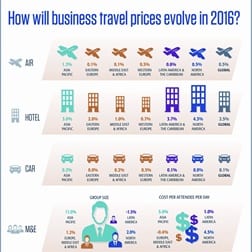A surging demand
Providing a picture of a dynamic business travel industry, the research report from GBTA Foundation reveals global hotspots where demand is driving air travel price increases
 A new research identifies six hotspots – India, China, Colombia, Mexico, Singapore and Australia- where increased business travel demand is driving significant air price increases. This is despite global air travel prices displaying signs that they will be essentially flat in 2016. “Business travel is a leading indicator of global economic activity,” said Joseph Bates, vice president of research, GBTA Foundation. “The top-line pricing outlook for air, hotel and ground in 2016 is surprisingly stable. But when you dig deeper, the data reveals global hotspots where demand is driving air travel price increases. For 2016, India, China, Colombia, Mexico, Singapore and Australia are projected to top the list.”
A new research identifies six hotspots – India, China, Colombia, Mexico, Singapore and Australia- where increased business travel demand is driving significant air price increases. This is despite global air travel prices displaying signs that they will be essentially flat in 2016. “Business travel is a leading indicator of global economic activity,” said Joseph Bates, vice president of research, GBTA Foundation. “The top-line pricing outlook for air, hotel and ground in 2016 is surprisingly stable. But when you dig deeper, the data reveals global hotspots where demand is driving air travel price increases. For 2016, India, China, Colombia, Mexico, Singapore and Australia are projected to top the list.”
These findings come from the 2016 Global Travel Price Outlook, research from the GBTA Foundation, the education and research arm of the Global Business Travel Association (GBTA), and Carlson Wagonlit Travel (CWT). “The data provides a compelling picture of a dynamic business travel industry,” said Christophe Renard, vice president, CWT Solutions Group.
Air
Airline prices are set to be nearly flat on a global basis due to significantly lower energy prices, steady increases in capacity and stable demand. Regionally, the report projects:
- Asia Pacific and Latin America – small price increases (1.2 per cent and 0.8 per cent respectively)
- In Europe, Middle East and Africa, prices will see a small increase (0.4 per cent)
- In North America, (0.5 per cent) — with the US slightly up (0.5 per cent) and Canada sharply down (-5 per cent).
Yet, global and regional numbers reveal only part of the picture. There are six countries that are seeing projected price increases as a result of higher demand, including:
- Singapore – by three per cent, driven by lower energy prices and less restrictive monetary policy that will fuel demand
- Colombia – by three per cent, caused by a rapidly growing middle class and relatively stable economy, which are driving demand while capacity has grown at a modest rate
- Mexico – by three per cent, driven by strong domestic and international demand
- India – by 2.6 per cent, driven by spiking business and consumer confidence
- China – by 2.8 per cent, bolstered by domestic demand and strong demand despite slowing economic growth and business travel volume
- Australia – by 2.7 per cent, as improving business conditions will boost domestic air travel.
A seventh nation – Venezuela – is projected to see a 6.3 per cent increase, caused by high inflation, the drop in oil prices and a currency fixed to the US$.
Hotel
Globally, 2016 will show an increase in hotel prices because demand is overtaking supply in every major global region:
- Asia Pacific will see hotel prices rise by three per cent — led by Singapore, Japan and Australia
- In Europe, Middle East and Africa, hotel prices will see a moderate increase at 1.8 per cent, although many European countries will experience price increases in local currency due to exchange rates with the US$. Prices in Russia will rise significantly due to the drop in oil prices and sanctions
- In Latin America, prices will rise— 3.7 per cent — due to high inflation in some nations, particularly Venezuela and Brazil
- In North America, high demand will increase rates by 4.3 per cent, driven by economic activity in the Bay Area, Los Angeles and other major US cities.
Ground
Car rental pricing has been under pressure for a number of years. Demand isn’t rising sharply enough, and fleets are not being managed tightly enough, leading to stagnant rates globally and regionally. The most interesting trend seen globally revolves around the sharing economy.
There may be an impact to rental car companies’ car share and sedan/ black car segments.
Meetings and events
Across the globe, only modest increases are expected in cost per attendee per day and group size, with the exception of Asia Pacific which will see a five per cent increase in cost and an 11 per cent increase in group size. Strong demand from China and India is the major driver for the region’s increasing cost and group sizes.
North America will also see a 4.5 per cent cost per attendee per day increase, with food and beverage pressures continuing to be a significant driver of costs.

